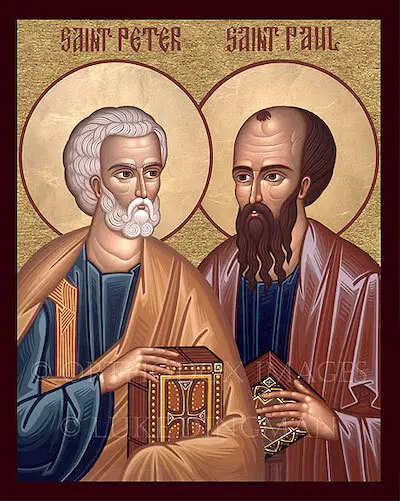To take from one merely to give to another; to discharge one debt by incurring another.
Rob Peter to pay Paul
What's the meaning of the phrase 'Rob Peter to pay Paul'?
What's the origin of the phrase 'Rob Peter to pay Paul'?
There’s a text, first published in 1661, that purports to explain the origin of this expression – Peter Heylyn’s Ecclesia Restaurata:
The lands of Westminster so dilapidated by Bishop Thirlby, that there was almost nothing left to support the dignity; for which good service he had been preferred to the see of Norwich, in the year foregoing. Most of the lands invaded by the great men of the court, the rest laid out for reparation to the church of St Paul – pared almost to the very quick in those days of rapine. From hence first came that significant by-word (as is said by some) of robbing Peter to pay Paul.
A 350 year-old text claiming to explain the origin of a phrase is usually almost as good as a smoking gun for etymologists. Regrettably, Heylyn’s understanding was flawed; the phrase was known long before 1661 and even before the birth of the 16th century cleric Thomas Thirlby. The ecclesiastical tome Jacob’s well: an English treatise on the cleansing of man’s conscience, circa 1450, includes the phrase in it’s original form:
To robbe Petyr & geve it Poule, it were non almesse but gret synne.
The expression may be even earlier than 1450. John Wyclif’s Selected English Works contains this text:
Lord, hou schulde God approve that you robbe Petur and gif is robbere to Poule in ye name of Crist?
There is however, some dispute as to the date of the above. It is reprinted in a Victorian book but the original is now lost. If it does indeed arise from Wyclif the date would be 1380. Others have speculated that a more realistic date is around 1500.
The expression was well enough established in English for it to have been considered proverbial by John Heywood when he published A Dialogue conteinyng the nomber in effect of all the Prouerbes in the Englishe tongue in 1546:
Rob Peter and pay Paul: thou sayest I do;
But thou robbest and poulst Peter and Paul too
The phrase was also in use in other European countries and was known in France by at least 1611, when Cotgrave produced A Dictionarie of the French and English Tongues:
Découvrir Saint Pierre pour couvrir Saint Paul [Strip Peter to clothe Paul]
The precise date is not the only aspect of this phrase that is somewhat uncertain. Scholars also disagree as to the thinking of whoever coined it. Given that any two names would work in a ‘rob X to pay Y’ proverb, why choose Peter and Paul? It has been suggested that the primary reason for Peter and Paul is the alliteration, that is, the same reason that Jack was paired with Jill when they went up the hill. That may well be part of the story, but there’s surely more to it. The similarities between Saint Peter and Saint Paul go deeper than their sharing of the letter P.
The expression was coined at a time when almost all English people were Christian and they would have been well used to hearing Peter and Paul paired together. They were both apostles of Christ, both martyred in Rome and shared the Feast Day on 29th June. This commemoration now passes by with little mention, but not so in medieval England. The essence of the meaning of ‘rob Peter to pay Paul’ is the pointlessness of taking from one only to give to another who was similar. There are many churches of Saint Peter and Saint Paul in England and throughout Europe. It may not be the case that, as Peter Heylyn asserted, that the phrase arose from the borrowing of money from one church to fund another, but from the familiarity of the notion of Peter and Paul being alike and inseparable.
See also: the List of Proverbs.
The history of “Rob Peter to pay Paul” in printed materials
Trend of rob peter to pay paul in printed material over time
Related phrases and meanings
Browse more Phrases
About the Author

Phrases & Meanings
A-Z
A B C D E F G H I J K L M N O P Q R S T UV W XYZ
Categories
American Animals Australian Bible Body Colour Conflict Death Devil Dogs Emotions Euphemism Family Fashion Food French Horses ‘Jack’ Luck Money Military Music Names Nature Nautical Numbers Politics Religion Shakespeare Stupidity Entertainment Weather Women Work
How did we do?
Have you spotted something that needs updated on this page? We review all feedback we receive to ensure that we provide the most accurate and up to date information on phrases.
